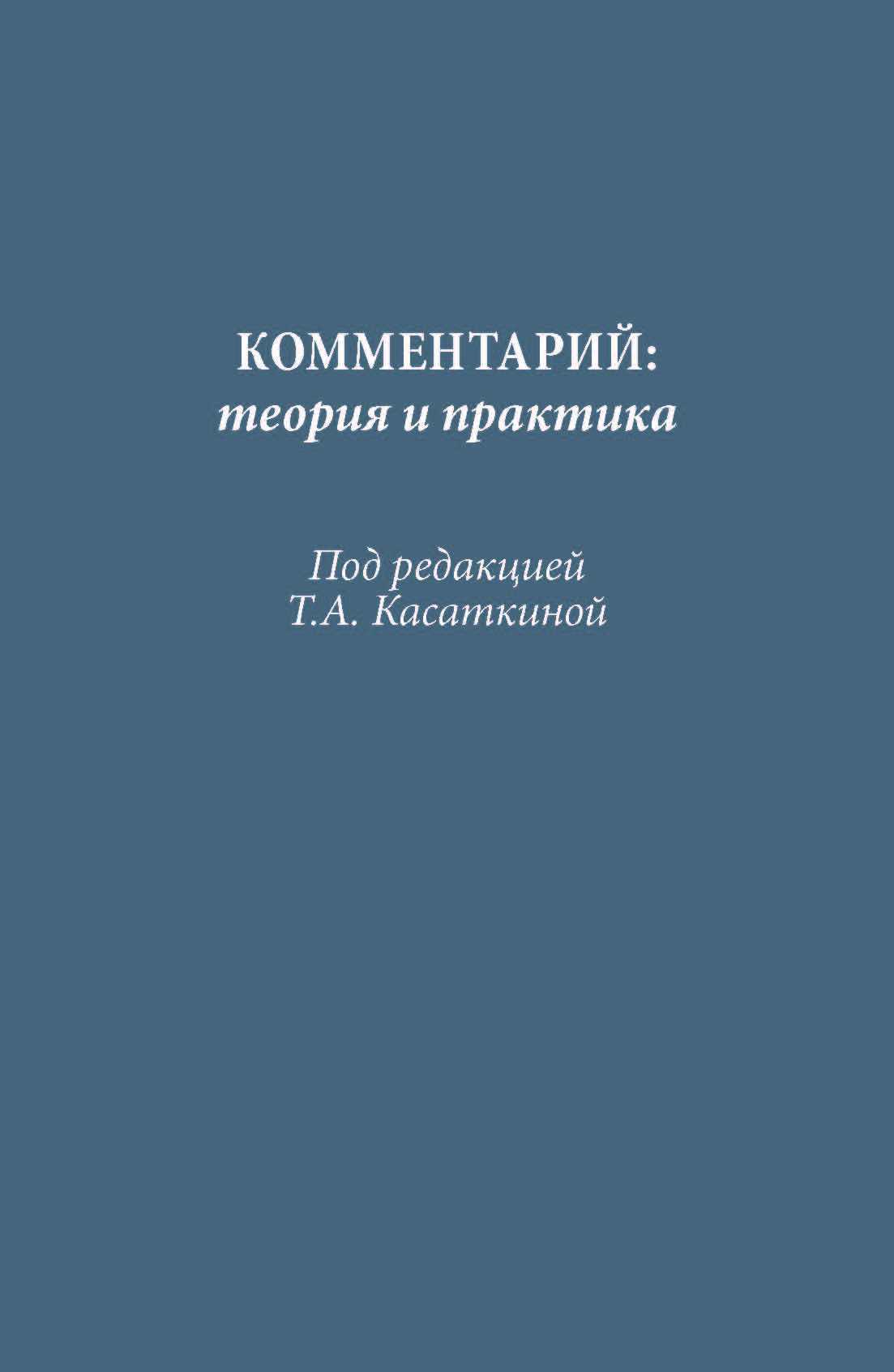Information about ex. editor:
Tatyana A. Kasatkina
Tatiana A. Kasatkina, DSc in Philology, Director of Research, Head of the Research Centre “Dostoevsky and World Culture”, A.M. Gorky Institute of World Literature of the Russian Academy of Sciences, Povarskaya 25A, bld. 1, 121069 Moscow, Russia.
https://orcid.org/0000-0002-0875-067X
E-mail:
Abstract:
The volume Commentary: Theory and Practice is a largescale multidimensional collective research that examines the problems of commentary. In most cases, authors are scholars dedicated both to theoretical research and commentary, trying here to reflect theoretically on their own longtime experience as commentators and editors. The works here presented discuss the following questions: “Commentary as an ontological structure and an epistemological practice”, “Commentary as a modality culture exists and develops”, “The most relevant typologies of commentary in modern publications”, “Commenting 19th and 20th centuries Russian literature in the light of newly discovered texts and traditions”, “The intended recipient of commentary, and commentary without recipient”, “Commentary on esoteric texts”, “Esoteric commentary on children’s literature”, “Typologies of editions and suitable typologies of commentary”, “Commentary and interpretation”, “Commentary as evaluation, polemic, or competition of/with the commented text”, “The meaning of commenting realia in a symbolic text”, “Commenting realia in the age of the Internet”, “Role and function of the author’s biography in commenting texts”, “Preface as a form of commentary”; “Commenting translated texts: translation that needs commentary, and translation that allows to avoid commentary”, “Commentary as a form of creativity and a literature genre”, “The being of literature as a process of commentary”, “Commentary on incomplete texts”, “Auto-commentary”, et al.
Keywords: Problems of commentary, theory of commentary, experience and practice of commentary, commentary and translation, commentary as a cultural phenomenon, commentary of realia, auto-commentary, commentary on incomplete texts, sources of commentary, literary text as a form of commentary, liturgy as a commentary to scriptural texts, commentary in the Internet era.
CONTENTS
COMMENTARY
AS THE A CULTURAL PHENOMENON
Tatiana A. Kasatkina
Commentary in Culture
Natalia R. Lidova
Commentary in Ancient India
Alexander Sh. Gumerov
Orthodox Church Service as a Commentary to the Biblical Text
Gleb A. Butuzov
Commentary and Interpretation of Esoteric Texts
Svetlana B. Likhacheva
Fiction as a Commentary on Reality — Reality as the Roots of Fiction: European Epics and J.R.R. Tolkien’s Original Legendarium
Lidiia I. Sazonova
Forms of Commentary in 16–17th Century Cyrillic Printing
Vladimir A. Gubailovsky
The New Book of Humankind: Commentary in the Age of Wikipedia
Anna V. Toporova
Commentary and Self-Commentary in the Middle Ages (the Case of Dante Alighieri)
SELF-COMMENTARY:
TYPES, PURPOSES, FUNCTIONS
Lidiia I. Sazonova
The Author’s Commentary in the Space of the Text
Ekaterina Ju. Moiseeva
The Role of Narrator’s Commentaries in the Organisation of the Creative Whole in Mark Z. Danilevsky’s Novel House of Leaves
AND NEARLY SELF-COMMENTARY:
TRANSLATIONS PROBLEMS
Elena Mazzola
The Inevitability of the Commentary: a Translator’s “Blind Spots”
Elena Mazzola
Translation versus Commentary
COMMENTARY:
THEORETICAL AND PRACTICAL PROBLEMS
Evgenia V. Ivanova
“…The Main Thing Is not Shakespeare, but the Notes to Him”: Academic and Educational Commentary, Commentary as an Autobiography, Research and Investigation
Tatiana A. Kasatkina
What is Realia? Problems of Real Commentary
Caterina Corbella
“If Not All [Words] Then at Least Their Meaning”: Comparative Analysis of Commentaries on Dante’s Vita Nuova
Natalia N. Smirnova
M.O. Gershenzon, Commentator of Pushkin
Irina Z. Surat
Commentary on Mandelshtam’s Texts: Problems and Practice
Olga A. Dekhanova
Commentaries on Dostoevsky’s “Gastronomic Language” as a Necessary Tool for a “Slow Reading”
Anna L. Gumerova
The Necessary Commentary on Fantasy
Valentina S. Sergeeva
A Source as the Cause of Confusion: Commentary and Interpretation of I.I. Gorbachevsky’s Notes
Karen A. Stepanyan
The Author’s Biography as a Necessary Source of Commentary for F.M. Dostoevsky’s Novel The Brothers Karamazov
PROBLEMS
OF COMMENTINGON UNFINISHED TEXTS
Irina L. Popova
The Problem of Comprehending, Commenting and Publishing Drafts and Unfinished Texts
COMMENTARY:
PRACTICE
Irina L. Lagutina
Ideology vs. Poetics: Commentaries on the Anniversary Edition of Goethe’s Works (1932–1949)
Andrey V. Namestnikov
Comprehending and Commenting Patristic Texts by the Example of Russian Commentaries on Saint Augustine’s Treatise De Civitate Dei. Search for an Adequate Approach
Anna L. Gumerova
I.H. Jung-Stilling’s Victorious Tale, or The Triumph of the Christian Faith as a Possible Source of “The Grand Inquisitor”
Ekaterina A. Dais
Hidden Meanings of Children’s Literature: Andersen, Travers, Lagin
Pavel E. Fokin
From the Experience of Commenting V.S. Vysotsky’s Poetry in His Collected Works in 11 Volumes (2012)



